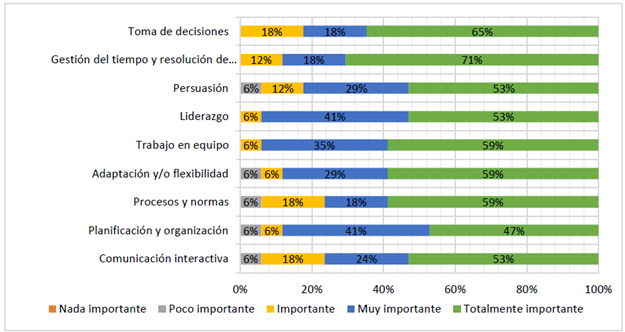Professional profile of the graduate and its relationship with employability: Case study in tourism students of a Peruvian university
DOI:
https://doi.org/10.51252/race.v2i2.586Keywords:
contextual attitudes, personality factors, structural factors, basic skillsAbstract
Employability has become a determining factor for the professional success of university graduates; in the field of Tourism Administration, it is crucial for students to acquire a strong professional profile that enables them to face the challenges and demands of the industry. The objective of this study was to determine the relationship between the professional profile of graduates and the employability of tourism students from a Peruvian university. A descriptive correlational research design was employed. The sample consisted of 34 evaluations conducted by area supervisors during the students' pre-professional internships. Data collection was carried out through two surveys that were validated by experts. The results revealed a positive correlation of 0.3365 between the variables under analysis. It was found that the professional profile of graduates exhibited a high level of proficiency, accounting for 65% of the sample, while the employability of the students was high, reaching 94%. These findings suggest that as the professional profile strengthens, the likelihood of obtaining employment increases.
Downloads
References
Abelha, M., Fernandes, S., Mesquita, D., Seabra, F., & Ferreira-Oliveira, A. T. (2020). Graduate Employability and Competence Development in Higher Education—A Systematic Literature Review Using PRISMA. Sustainability, 12(15), 5900. https://doi.org/10.3390/su12155900
Altamirano Sánchez, P. F. (2014). Análisis de la empleabilidad de los graduados de la carrera de Psicología del Trabajo de la Universidad Politécnica Salesiana sede Cuenca desde julio 2003 a abril 2014. Repositorio Institucional de la Universidad Politécnica Salesiana. https://dspace.ups.edu.ec/handle/123456789/7121
Bennett, D., Knight, E., & Rowley, J. (2020). The role of hybrid learning spaces in enhancing higher education students’ employability. British Journal of Educational Technology, 51(4), 1188–1202. https://doi.org/10.1111/bjet.12931
Caballer-Tarazona, M., Cuñat Giménez, R. J., Martínez Verdú, R., & Pardo-García, C. (2019). ¿Por qué eligen los estudiantes universitarios las titulaciones de turismo?. Análisis de los factores de interés y expectativas de empleo para el alumnado de la Universitat de València. Cuadernos de Turismo, 44, 43–65. https://doi.org/10.6018/turismo.44.404731
Carbajulca-Milla, M. (2023). Perfil de competencias y empleabilidad desde la perspectiva del egresado en turismo. Revista de Investigaciones de La Universidad Le Cordon Bleu, 10(1), 84–93. https://doi.org/10.36955/RIULCB.2023v10n1.008
Cruz Baylón, C. J. (2021). Competencias profesionales y perfil académico en estudiantes de la carrera de turismo y hotelería. Revista San Gregorio, 1(47), 50–64. https://revista.sangregorio.edu.ec/index.php/revistasangregorio/article/view/1647
Fernandes de Araújo, D. (2011). Formación profesional en turismo e inserción en el mercado laboral. Un estudio de caso del Polo Turístico Salvador/Bahía, Brasil, y su Entorno. Estudios y Perspectivas En Turismo, 20, 57–74. http://www.scielo.org.ar/pdf/eypt/v20n1/v20n1a04.pdf
Fraser, C. J., Duignan, G., Stewart, D., & Rodrigues, A. (2019). Overt and covert: Strategies for building employability skills of vocational education graduates. Journal of Teaching and Learning for Graduate Employability, 10(1), 157–172. https://eric.ed.gov/?id=EJ1235632
García Ancira, C., & Treviño Cubero, A. (2020). Las competencias universitarias y el perfil de egreso. Revista Estudios Del Desarrollo Social: Cuba y América Latina, 8(1). https://revistas.uh.cu/revflacso/article/view/5631
Hernández Sampieri, R., Fernández Collado, C., & Baptista Lucio, P. (2014). Metodología de la investigación (6ta ed.). McGraw-Hill Education.
Jackson, D., & Tomlinson, M. (2022). The relative importance of work experience, extra-curricular and university-based activities on student employability. Higher Education Research & Development, 41(4), 1119–1135. https://doi.org/10.1080/07294360.2021.1901663
Kenayathulla, H. B., Ahmad, N. A., & Idris, A. R. (2019). Gaps between competence and importance of employability skills: evidence from Malaysia. Higher Education Evaluation and Development, 13(2), 97–112. https://doi.org/10.1108/HEED-08-2019-0039
Miranda, E., Torres, A., Rotondo, E., & Mostajo, P. (2015). Perfil de competencias del profesional que cumple funciones de monitoreo, evaluación y gestión de evidencias de programas y proyectos de desarrollo. Un aporte para las decisiones basadas en evidencias. Anales de La Facultad de Medicina, 76, 67. https://doi.org/10.15381/anales.v76i1.10974
Monteiro, S., Almeida, L., Gomes, C., & Sinval, J. (2022). Employability profiles of higher education graduates: a person-oriented approach. Studies in Higher Education, 47(3), 499–512. https://doi.org/10.1080/03075079.2020.1761785
Pimienta, J., & de la Orden, A. (2017). Metodología de la investigación (3ra ed.) (Pearson Educación (ed.)).
Reguant-Álvarez, M., Vilà-Baños, R., & Torrado-Fonseca, M. (2018). La relación entre dos variables según la escala de medición con SPSS. REIRE. Revista d’Innovació i Recerca En Educació, 11(2), 45–60. https://doi.org/10.1344/reire2018.11.221733
Tito Huamaní, P. L. (2008). Empleabilidad de egresados de la facultad de ciencias administrativas de la UNMSM. Gestión En El Tercer Milenio, 11(22), 59–69. https://doi.org/10.15381/gtm.v11i22.9069

Published
How to Cite
Issue
Section
License
Copyright (c) 2023 Katty Alamo-Larrañaga

This work is licensed under a Creative Commons Attribution 4.0 International License.





